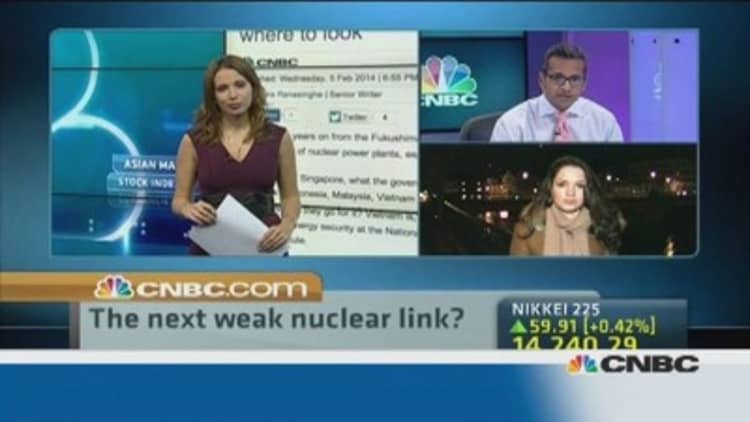Even as the U.S. shale boom has sent oil and gas production skyrocketing, interest in alternative energy has increased. Yet nuclear power is still largely shunned by environmentalists, who see the fuel source as too costly and inherently dangerous.
That, however, may be changing. Last week, more than 200 United Nations researchers threw their weight behind atomic energy, calling for a tripling of output within the coming years as a means to combat carbon emissions. The move comes against the backdrop of nuclear innovations that seek to address safety and cost issues that have hampered the sector.
Currently, support for nuclear power among most environmentalists is tentative at best. But at least a few voices within the movement insist that soaring global demand for energy makes it imperative for climate change advocates to fully embrace atomic power.
"Environmentalists have to learn to live with nuclear energy," said Josh Freed, vice president for energy at Third Way, a multi-issue centrist think tank in Washington. "The globe is going to be an increasingly high-energy planet ... and [emerging markets] are going to demand the same baseload energy that industrialized countries are used to."
Read MoreThe real front in US-Russia 'Cold War': Nuclear power
The chief environmental argument among nuclear power's backers is that its carbon emissions are the lowest among major power sources. Carbon emissions are among the chief cause of global climate change, according to the Environmental Protection Agency and a broad consensus of climate scientists.
That, however, hasn't dented opposition from many conservationists. While not completely opposed to atomic energy, they point out that it has its own environmental perils. Some argue against its economic viability as well.
"It's not that we're anti-nuclear, but that nuclear is not the best way to advance carbon control given its economic situation," Thomas Cochran, former director of the Natural Resources Defense Council's nuclear program, said in an interview.

Last month, the Energy Department provided loan support to two new domestic nuclear plants—the first to break ground in more than 30 years. They are part of a vanguard of next-generation plants that include so-called small modular reactors (SMRs), seen as safer and less costly. Meanwhile, with demand for power soaring in emerging markets, China and India are aggressively experimenting with thorium, an element that is more fertile and abundant than uranium, and less hazardous.
Cochran said that both SMRs and thorium have features that make them more attractive than traditional plants. Still, he said he doubts whether they'd find a receptive audience in an industry known for its glacial pace of change, and an infrastructure designed for large reactors and uranium.
Read More US energy chief: 'Green' includes nuclear and more
"Overall I think from a safety standpoint there is an improvement … but I don't think they are going to be competitive," said Cochran, a nuclear physicist. "The economics are just not there."
The report from the UN's Intergovernmental Panel on Climate Change comes as the nuclear industry is trying to overcome regulatory red tape and environmental resistance. The latter has proven difficult, especially with Japan's 2010 nuclear meltdowns still fresh in the minds of environmental groups.
Organizations like the Sierra Club forcefully argue against the "numerous issues" that dog nuclear energy—despite the fact that, as backers point out, there hasn't been an accident on U.S. soil since Three Mile Island's meltdown in 1979.
Mighty thorium?
It's precisely the memories of Fukushima and the 1986 Chernobyl disaster that make thorium reactors seem appealing to some. Although few countries are experimenting with the element, it is more abundant than uranium. The World Nuclear Association estimates the world's thorium supply at more than 5.3 million tons, with India ranked first.
Thorium's qualities make it easier to contain in the event of a reactor malfunction, experts say.
Leslie Dewan, co-founder and chief science officer at Transatomic Power– a nuclear power start-up that uses a spent uranium process similar to thorium—said in an interview that thorium has "significant safety advantages." A standard plant could cost as little as $2 billion, she said, a fraction of the cost of a uranium-based plant.
Read MoreIndia, Iran in deal to blunt effect of sanctions
Scarce funding and domestic concerns surrounding nuclear power, however, have made it hard to develop the process. "There isn't very much money to implement something new," Dewan said. "Once the [thorium] mining cycle gets developed it should be as cheap as natural gas, but we aren't mining right now."
The U.S., which has an infrastructure built around uranium, has been reluctant to embrace unproven technology like small reactors and thorium mining. That means any breakthroughs could be decades away, some say.
Countries like India and China have made thorium a linchpin of a long-term transition away from uranium, said Paul Genoa, director of policy development at the Nuclear Energy Institute.
However, "the reality is just not that easy," he said. "The nuclear industry is a very big ship … and you have to turn a big ship slowly."
—By CNBC's Javier David.


